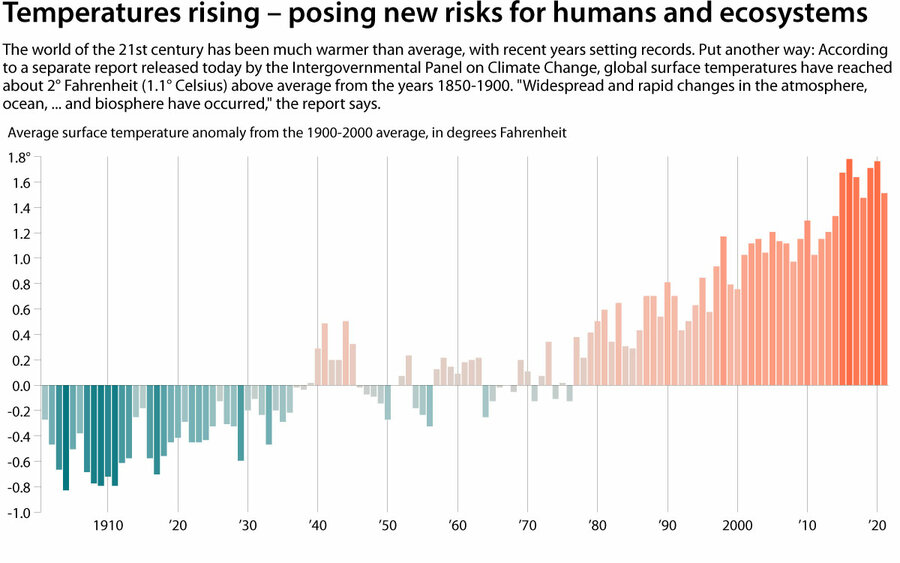UN report urges all-out climate push – now
Loading...
The world can avoid the most dire impacts of climate change, but only if it quickly and dramatically reduces greenhouse gas emissions, according to a major United Nations report released today.
Without intentional and transformational steps to lower the amount of the heat-trapping gases humans send into the atmosphere the world’s temperature will continue to increase, with a host of ecological and economic consequences.
Why We Wrote This
A new report sums up the known science on climate change – and walks a fine line between desperation and hope in an effort to spur a more forceful global response.
The report, from the Intergovernmental Panel on Climate Change, or IPCC, marks the conclusion of an eight-year, international effort to catalog the best and most current scientific understanding about climate change.
The authors seemed to be attempting to tread a fine line between conveying the desperate seriousness of the climate situation and also avoiding what has become known in climate circles as “doomerism” – the position that global warming is so bad and unfixable that there is nothing we can do about it. They recounted risks such as biodiversity loss and extreme weather from every fraction of a degree of warming, but also reiterated the ways societies can make the situation better.
“The climate time-bomb is ticking,” said U.N. Secretary-General António Guterres in a video message Monday. But the new report, he added, “is a survival guide for humanity.”
The world can avoid the most dire impacts of climate change, but only if it quickly and dramatically reduces greenhouse gas emissions, according to a major United Nations report released today.
Without intentional and transformational steps to lower the amount of the heat-trapping gases humans send into the atmosphere – from ramping down fossil fuel production to significantly increasing the amount of funding for new climate technologies – the world’s temperature will continue to increase, with a host of ecological and economic consequences.
“The climate time-bomb is ticking,” said U.N. Secretary-General António Guterres in a video message Monday. But the new report, he added, “is a survival guide for humanity.”
Why We Wrote This
A new report sums up the known science on climate change – and walks a fine line between desperation and hope in an effort to spur a more forceful global response.
The report, from the Intergovernmental Panel on Climate Change, or IPCC, marks the conclusion of an eight-year, international effort that catalogs and analyzes the best and most current scientific understanding about climate change. It synthesizes a voluminous amount of research on everything from the physical science of the world’s climate system to the vulnerabilities of economies and ecosystems to ways of reducing the impact of global warming and building resilience.
While the science behind this “synthesis report” is not new (the IPCC has released a series of reports over the past years that detail the various components), it does connect the dots and reflects an international consensus about the best path forward.
“It’s bringing the whole narrative together in one place,” says Rachel Cleetus, policy director with the Climate and Energy program at the Union of Concerned Scientists.
And this narrative is clear: Humans are altering the world’s climate and related natural systems in unprecedented ways, scientists say. And without major policy and behavior changes, the average global temperature is likely to rise above the internationally determined benchmark of 1.5 degrees Celsius above pre-industrial temperatures, likely within the next decade. That’s the point, scientists have estimated, beyond which climate disasters may accelerate and risk irreversible damage to Earth’s ecosystems.
No matter what people do now, temperatures are expected to continue to increase. That’s because greenhouse gas emissions are cumulative – what we put into the air 50 years ago is still there. (Indeed, carbon dioxide, the primary greenhouse gas, lasts 300 to 1,000 years once it is released. Other heat-trapping gases, such as methane, have shorter lives but cause greater increases in temperature.)
But it is also decidedly possible to minimize the damage, scientists say.
In today’s report, authors seemed to be attempting a fine line between conveying the desperate seriousness of the climate situation and also avoiding what has become known in climate circles as “doomerism” – the position that global warming is so bad and unfixable that there is nothing we can do about it. They recounted some of the key takeaways from earlier scientific reports, such as the potential biodiversity loss and extreme weather increases from every fraction of a degree of warming, but also reiterated the ways societies can make the situation better.
If the world dramatically reduces emissions, the future scenarios – for ecosystems, natural disasters, economic disruption, and a host of other factors – become far more positive. Every fraction of a degree makes a difference in the intertwined nature of climate impacts, scientists say – the 1.5 degree marker should not be viewed as a cliff, where if we make it we “win,” and if we don’t the game is over. As the multiple scientific reports over the past years show, there are myriad opportunities to both mitigate and adapt to the changing climate.
“With each new report, we have a better understanding of how things go together,” says Jason Smerdon, a Columbia University professor who co-wrote the textbook “Climate Change: The Science of Global Warming and our Energy Future.”
The challenge now is getting everyone, from governments to corporations to individuals, on board with the report’s recommendations. The report recommends an accelerated plan for decarbonizing the economy – which in practice means stopping, or not developing, fossil fuel projects, something few governments have proven they can or will do.
“This Synthesis Report underscores the urgency of taking more ambitious action,” said IPCC Chair Hoesung Lee in a press release. It “shows that, if we act now, we can still secure a livable sustainable future for all.”











